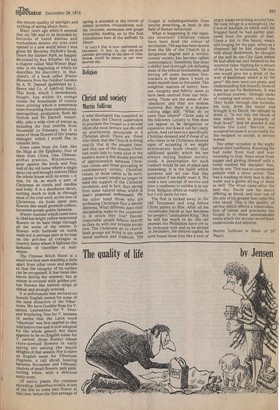Religion
Christ and society
Martin Sullivan
A wise theologian has reminded us that when the Church undertakes to proclaim the Gospel in a secular idiom she must beware lest she end up proclaiming secularism in a Christian idiom. There are those who think that the Church is doing exactly that at the present time, and that one of the reasons Christian truth fails to come alive in the modern mind is this double process of approximation between Christian values and those prevailing in contemporary society. Christian values, or those taken to be such, appear to many people no longer to need the support of the Christian revelation, and in fact, they spring from some natural sense which is man's perpetual endowment. On the other hand those who are professing Christians face a similar dilemma. What different does their discipleship make in the community in which they live? Decent, respectable people behave exactly as they do with one notable exception. The Christians go to church. Both groups are living in the same moral medium and tradition. The Gospel is indistinguishable from secular preaching, at least in the field of human behaviour.
What is happening in the opposite direction? Christian values have been dyed the colour of secularism. The sap has been drawn from the life of the Church to a dangerous degree and a revolutionary society has become rather commonplace. Somebody has done a skilful and thorough job defusing most of the ethical bombshells, and letting off some harmless firecrackers in their place. I want to make myself clear at this point. The weightier matters of mercy, honour, integrity and fidelity seem to have been omitted from our reckoning. These are the areas of the 'absolutes' and they are seldom explored. But there is a sharper cutting edge still. "What do ye more than others?" Christ asks of His followers. Loyalty to Him does not appear to be dangerous or expensive, nor does it call for costly action. And yet here is a specifically Christian demand and if those of us who claim to be Christians showed signs of accepting it we might demonstrate more clearly that additional quality which we are always saying human society needs. A prescription for such conduct would be out of place and misleading. It is the Spirit which quickens and we can find this inspiration if we really want it. We need a new concept of service and then a readiness to exhibit it in our lives. Religion offers us many such, but I will settle for two.
The first is tucked away in the Old Testament and long before Christ points to Him. After all his vicissitudes David at last becomes his people's "undoubted King." But he still has much to do. His old enemies the Philistines have yet to be reckoned with and as he settled in Jerusalem, the natural capital, he soon found these foes like a' nest of angry wasps swarming around him. He took refuge in a stronghold, the Cave of Adullam, in which with his brigand band he had earlier sheltered from the pursuit of Saul. Upon a day in this haunt, weary and longing for the past, when as a shepherd lad he had roamed the hills about Bethlehem, he thought of the well by the City Gate where he had often sat and listened to the warriors' tales. Sighing for a return of the past, he exclaimed, "Oh that one would give me a drink of the well of Bethlehem which is by the gate!" His men were not poets, and understanding him literally three of them set out for Bethlehem. It was a perilous journey, through ranks of cunning and unscrt. ulous foes. They broke through this formidable host, drew the water and brought it to David. He refused to drink it, "Is not this the blood of men which went in jeopardy of their lives?" And he poured it out before the Lord. Service, not accepted because it is too costly for the recipient to accept, is service indeed.
The other occasion is the night before the Crucifixion. Knowing He had come from God and was returning to God, Jesus arose from supper and girding Himself with a towel washed His disciples' feet, one by one. This was no ceremonial gesture with a silver salver. This was a washing of dirty feet in dirty water and a gentle drying of them as well. The ritual came -alive the next day. David saw his men's offering as blood, and now out of the side of his greater Son came His own blood. This is the quality of service which effects a transvaluation of values and proclaims the Gospel in in those unmistakable terms which the secular world both understands and admires.
Martin 'Sullivan is Dean of St' Paul's














































 Previous page
Previous page